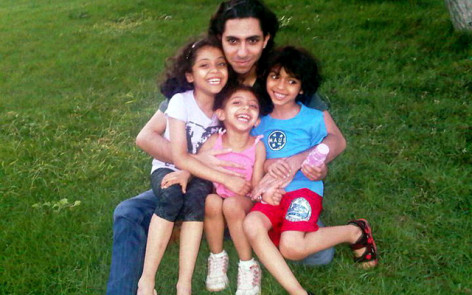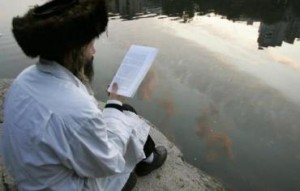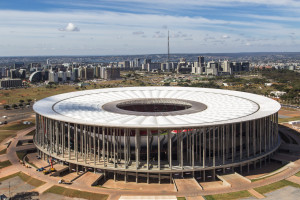News from Saudi Arabia, Ukraine and Brazil
Tuesday's World Events — Posted on May 13, 2014
SAUDI ARABIA – Court orders 1,000 lashes and ten-year sentence for editor of website that discussed religion

Raif Badawi with his 3 children.
A Saudi Arabian court has sentenced the editor of a website that discussed religion in the ultra-conservative Islamic kingdom to 10 years in jail and 1,000 lashes.
Raif Badawi, who started the “Free Saudi Liberals” website, was arrested in June 2012 and charged with cyber-crime and disobeying his father – a crime in the Arab state, local media has reported.
His website included articles that were critical of senior religious figures such as Saudi Arabia’s Grand Mufti and allegedly insulted Islam and religious authorities, according to Human Rights Watch. [The Grand Mufti is the highest official of religious law in a Muslim country. His main role is to give opinions (fatwas) on legal matters and on social affairs. The Saudi court system, which is governed by Sharia (Islamic) law, is heavily influenced by the opinions of the Grand Mufti.]
Prosecutors had demanded Badawi be tried for apostasy (a total desertion of or departure from one’s religion; rejecting the truth of Allah in this case), a charge which carries the death penalty, but this was dismissed by the judge.
Badawi was originally sentenced to seven years in prison and 600 lashes in July last year, but an appeals court overturned the sentence and ordered a retrial – which then earned him a more severe sentence.
His punishment comes shortly after Saudi Arabia criticized Norway’s human rights record and accused it of not doing enough to counter criticism of the prophet Mohammed.
The gulf state also demanded all criticism of religion and of the Prophet Mohammed be made illegal in Norway.
Badawi’s lawyer, human rights activist Waleed Abu al-Khair, will not be able to represent him in an appeal because he has also been jailed and is currently awaiting trial on criminal charges that include “breaking allegiance with the king,” and “making international organizations hostile to the kingdom.”
His retrial led the judge to impose a harsher punishment and fine him one million riyals (almost $267,000).
In April, the Kingdom introduced a series of new laws which define atheists as terrorists, according to Human Rights Watch.
In a string of royal decrees and an overarching new piece of legislation to deal with terrorism generally, the Saudi King Abdullah has clamped down on all forms of political dissent and protests that could “harm public order.”…
[Badawi has been in prison since June 2012 and was found guilty in July 2013 of insulting Islam through his website and in television comments. He was sentenced to seven years in prison and 600 lashes for violating the nation’s anti-cybercrime law. After that first sentence, Ensaf Haidar, Badawi’s wife, said she was devastated by the news. “I don’t know what to do,” Haidar said. “Raif did nothing wrong.” Haidar and the couple’s three children now live in Lebanon. Estranged from her family, Haidar said it would be impossible to take her children back to Saudi Arabia. The stigma is too strong there, she said.]UKRAINE – Ukrainian Jews form defense force to combat anti-Semitic attacks
Ukrainian Jews with combat skills have formed a rapid intervention force to stop anti-Semitic attacks.
The force, which was set up in recent weeks, currently is made up of eight men who served in the Ukrainian or Israeli armies or have martial arts skills, the team’s founder, Tzvi Arieli, told JTA Thursday.
The defenders are armed with baseball bats that an American donor whose family hails from Kiev sent the team, he added. “We are trying to raise funds for bullet-proof vests which would greatly increase safety if the situation escalates,” said Arieli, a Latvia-born former soldier of a special forces unit in the Israel Defense Forces who lives in Ukraine.
Arieli said he set up the task force – which now has its own Facebook page – at the request of Rabbi Yaakov Dov Bleich, a chief rabbi of Ukraine, following a series of anti-Semitic attacks that occurred in Kiev and beyond in the wake of a bloody revolution that erupted in November over former Ukrainian President Viktor Yanukovych’s alleged corruption and perceived allegiance to Russia.

Orthodox Jewish man reads at a lake in Uman, Ukrainian (Reuters)
Yanukovych was ousted from power in February. The following month, Russian-backed troops seized control of the Crimean Peninsula – an area which used to belong to Ukraine and which Russia promptly annexed [took over], claiming residents had sought Russian protection for fear of Ukrainian nationalism in the post-revolution period. Hundreds have died in clashes between different interest groups and militias.
“In talks with officials, it became clear the authorities could offer limited protection to the Jewish community so we needed to take security into our own hands,” said Arieli, who in March helped organize the medical evacuation of Ukrainians who had been wounded in fighting to Israel. He said the self-defense team was acting with Ukrainian authorities’ knowledge and consent.
Arieli also noted that Ukraine, where anti-Semitic assaults used to be rare occurrences, has seen four serious physical assaults against Orthodox Jews and two attempts to torch synagogues.
“These attacks were well-planned,” said Arieli, who blamed pro-Russian militants whom he said were trying to justify Russian aggression. The Kremlin and some pro-Russian Ukrainians have blamed far-right Ukrainians for the attacks.
“The current reality means that even tomorrow we could find 20 people with firebombs outside the synagogue. We need to be prepared,” said Arieli. …
BRAZIL – High cost, corruption claims mar Brazil World Cup

National Stadium of Brazil Mane Garrincha in Brasilia
The cost of building Brasilia’s World Cup stadium has nearly tripled to $900 million in public funds, largely due to allegedly fraudulent billing, government auditors say. The spike in costs has made it the world’s second-most expensive soccer arena, even though the city has no major professional team.
Mane Garrincha stadium, which boasts 288 imposing concrete pillars holding aloft a high-tech self-cleaning roof, has become the costliest project related to Brazil’s $11.5 billion World Cup. Critics call it the poster child for out-of-control spending and mismanagement, or worse.
Now, an Associated Press analysis of data from Brazil’s top electoral court shows skyrocketing campaign contributions by the very companies involved in the most Cup projects. The lead builder of Brasilia’s stadium increased its political donations 500-fold in the most recent election.
The financial links between construction firms and politicians add to deep suspicions among Brazilians that preparations for soccer’s premier event beginning next month are tainted by corruption, raising questions about how politicians who benefit from construction firms’ largesse can be effective watchdogs over billion-dollar World Cup contracts. Anger over perceived corruption helped fuel huge protests last year, and there are fears more unrest could mar the Cup.
“These donations are making corruption in this country even worse and making it increasingly difficult to fight,” said Renato Rainha, an arbiter at Brasilia’s Audit Court, which is investigating the spending on Brasilia’s stadium. “These politicians are working for those who financed campaigns.”
In a 140-page report on the stadium, the auditors found $275 million in alleged price-gouging — and they have only examined three-fourths of the project. They forecast that fully one-third of the stadium’s cost may be attributable to overpricing, the largest single chunk of $500 million in suspect spending auditors have flagged in World Cup construction projects so far.
Federal prosecutors say as yet no individuals or companies face corruption charges related to World Cup work, but it could take years for official audits to be finalized and judged by civil courts, a required step before any criminal charges are filed. There are at least a dozen separate federal investigations into World Cup spending.
“Is there corruption in the Cup? Of course, without a doubt,” said Gil Castelo Branco, founder of the watchdog group Open Accounts that campaigns for transparency in government spending. “Corruption goes where the money is, and in Brazil today, the big money is tied up in the Cup.” …
In a poll last year, three-fourths of respondents said the World Cup construction has been infused with corruption.
Such beliefs fueled widespread and often violent anti-government protests last June that sent more than a million Brazilians into the street during FIFA’s Confederations Cup soccer tournament, the warm-up event to the World Cup. Many protesters railed against corruption and the billions spent to host the events.
The distrust isn’t surprising in a nation where 40 percent of federal congressmen have criminal cases pending against them before the country’s highest court, according to the watchdog group Focus on Congress, bolstering concerns the rise in campaign contributions found by the AP likely influenced government spending on the Cup.
Critics say four of the stadiums will become white elephants after the tournament because they are in cities that cannot support them…
(The news briefs above are from wire reports and staff reports posted at Britain’s The Independent and the Jerusalem Post on on May 8 and YahooNews on May 12.)
Questions
1. For each of the 3 countries, provide the following information:
a) capital:
b) location/the countries that share its borders:
c) the religious breakdown of the population:
d) the type of government:
e) the chief of state (and head of government if different) [If monarch or dictator, since what date has he/she ruled? - include name of heir apparent for monarch]:
f) the population:
[Find the answers at the CIA World FactBook website. For each country, answers can be found under the "Geography" "People" and "Government" headings. Go to worldatlas.com for maps and a list of continents.]
NOTE: Before answering the questions below, read the info under “Background” and watch the videos under “Resources.”
2. For SAUDI ARABIA:
a) list the who, what, where and when of the news item
b) What charges were brought against 32 year-old Raif Badawi?
3. For UKRAINE:
a) list the who, what, where and when of the news item
b) Why have Arieli and others formed this defense force? Who do they blame for the attacks?
c) What facts about the defense force and Ukrainian government do Arieli and Rabbi Bleich stress?
4. For BRAZIL:
a) list the who, what, where and when of the news item
b) What is the World Cup? How often does it take place? How many people watch it?
Background
UKRAINE
The team was scheduled to deploy on Friday in Kiev to fend off any violence against Jewish targets during events that commemorate the May 9 surrender 69 years ago of Nazi Germany to the Russian army.
The unit is a neighborhood watch organization akin to the ultra-orthodox Shomrim [guards] group that protects Jews in Brooklyn, Ukrainian Chief Rabbi Yaakov Dov Bleich told The Jerusalem Post.
"It is a community group that works along with police and the local authorities to strengthen the protection of communal buildings and the local community," he said. "It's not at all a vigilante" organization.
The self described Volunteer self-defense group was set up to supplement the police who are "overloaded," Bleich continued, explaining that such a move was "a no-brainer in the Ukraine."
The group is "working closely with the authorities," he added. (from the Jerusalem Post article above)
BRAZIL
The price of building or refurbishing the 12 arenas alone has nearly quadrupled from initial estimates, helping make Brazil's World Cup the priciest yet.
Funding for Brasilia's stadium - whose cost among soccer venues is topped only by England's Wembley Stadium - relies solely on financing from the federal district's coffers, meaning every cent comes from taxpayers. The auditors' report found instances of what appears to be flagrant overpricing.
For instance, the auditor's report says transportation of prefabricated grandstands was supposed to cost just $4,700 — but the construction consortium billed the government $1.5 million. The consortium is made up of Andrade Gutierrez, a construction conglomerate, and Via Engenharia, an engineering firm.
The steel to build the arena represented one-fifth of total expenses, and auditors say wasteful cutting practices or poor planning added $28 million in costs, the single biggest overrun uncovered so far.
The audit questions why the consortium had to discard 12 percent of its steel in Brasilia when Andrade Gutierrez, using the same cutting methods, lost just 5 percent of steel at another stadium it helped build in the Amazon city of Manaus and virtually none at a Cup arena in Cuiaba.
Another $16 million was lost when Brasilia's government inexplicably failed to enforce a fine against Andrade Gutierrez for a five-month delay in completion of the main portion of the stadium.
Auditors also say they spotted $2.3 million worth of materials that were simply listed multiple times on bills.
Andrade Gutierrez did not respond to an AP request for comment on the accusations of cost overruns.
But Claudio Monteiro, the head of the government's World Cup committee in Brasilia that is responsible for oversight, said the audit court's allegations are simply wrong and that all spending on the Brasilia stadium would be justified.
He questioned why the report came out so close to the opening of the tournament. "That's why I say they're trying to spoil the party," Monteiro said from his office outside the stadium. "We're going to show how this report is off base."
Monteiro is the former chief of staff to Brasilia's Gov. Agnelo Queiroz, a position he was forced to leave in April 2012 amid accusations he was part of a widespread kickback scheme. That scandal also forced him to give up his seat on the World Cup committee, but no charges were filed and he returned to the post a few months later.
Sports Minister Aldo Rebelo, a member of the Communist Party of Brazil, defended the legacy the Cup will leave behind for average Brazilians and said anybody responsible for misspent public funds would be found out.
"No disservice will be done to the people because of this Cup," Rebelo said in a recent interview at his office, adorned with busts of Mao Zedong, Karl Marx and Abraham Lincoln. "If any corruption is proven, it will go through our legal system and punishments will be handed out for anyone found responsible." (from the YahooNews article above)
